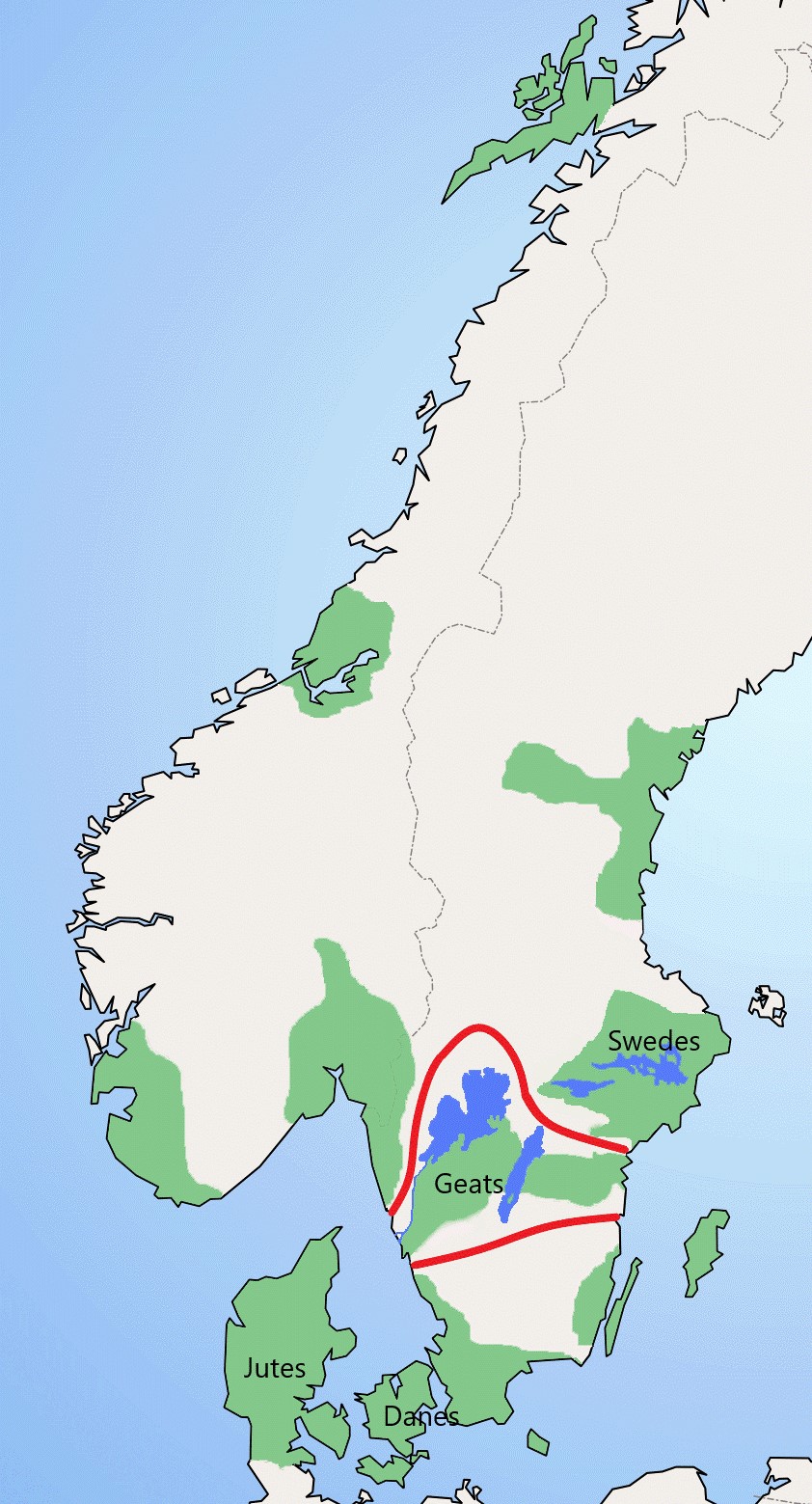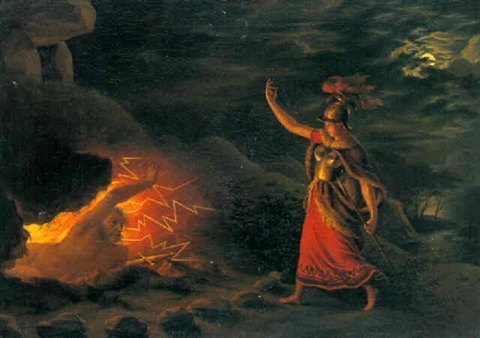|
Humli
Humli is a legendary king of the Huns who appears in the Hervarar Saga. He is the Grandfather of Hlod, illegitimate son of Heidrek, King of the Goths. Role in the saga After Heideric's death, Humli tells his grandson to go to his father's funeral and demand his heritage. As Hlod arrives at Heideric's funeral he meets his brother Angantyr. Angantyr invites his brother to celebrate with him, but Hlod tells him that he didn't come to fast, but to demand his half of the Kingdom. Agantyr refuses his demand, instead offering him one third of the kingdom and a large number of slaves. He is interrupted by Gizur king of the Geats who says that Hlod does not deserves this as he is the "son of a slave" and a "Bastard". Offended, Hlod returns to his grandfather. Together, they build an army consisting of all horses and men of the steppe and attack the Goths, led by Agantyr's sister, a shieldmaid named Hervor Hervör is the name shared by two female characters in the Tyrfing Cycle, present ... [...More Info...] [...Related Items...] OR: [Wikipedia] [Google] [Baidu] |
Heidrek
Heidrek or Heiðrekr (Old Norse: ) is one of the main characters in the cycle about the magic sword Tyrfing. He appears in the '' Hervarar saga'', and probably also in ''Widsith'',line 115, as ''Heathoric'' together with his sons Angantyr (''Incgentheow'') and Hlöð (''Hlith''), and Hlöð's mother Sifka (''Sifeca''). The etymology is , meaning "honour", and , meaning "ruler, king". Youth Heidrek was the son of king Höfund and his wife Hervor, a shieldmaiden. Like his mother in her youth, he was ill-natured and violent. To amend this, he was raised by the wise Geatish king Gizur, but this did not improve his disposition. One day, when his parents were having a banquet, Heidrek arrived uninvited and late at night, he started a quarrel which ended in manslaughter. His father, King Höfund, banished Heidrek from his kingdom, although Hervor did her utmost to soften Höfund's feelings against his son. His father's advice However, before Heidrek left, his father gave him some words ... [...More Info...] [...Related Items...] OR: [Wikipedia] [Google] [Baidu] |
Gizur
Gizur, Gizurr or Gissur was a King of the Geats. He appears in ''The Battle of the Goths and Huns'', which is included in the '' Hervarar saga'' and in editions of the ''Poetic Edda''. Gizur was the foster-father of Heidrek, who made a coup-d'état in Reidgotaland, the land of the Goths (see Oium and the Chernyakhov culture). When Heidrek was dead, Gizur arrived in the Goth capital Arheimar on the Dniepr (''Danpar'') to pay homage to his foster-son. Heidrek's son Angantyr, who was the new king of the Goths, held a great banquet in the honour of his father. Then Heidrek's illegitimate son Hlöd, who had grown up among the Huns, arrived to claim his share of the inheritance. Angantyr offered a great many riches and a third of the Goth kingdom, but before Hlöd could answer, Gizur reminded Angantyr that Hlöd was only a bastard son and did not deserve such riches. This caused an invasion of the Hunnish Horde (approximately 350,000 men), and prospects looked grim. Gizur supported A ... [...More Info...] [...Related Items...] OR: [Wikipedia] [Google] [Baidu] |
Germanic Heroic Legend
Germanic heroic legend (german: germanische Heldensage) is the heroic literary tradition of the Germanic-speaking peoples, most of which originates or is set in the Migration Period (4th-6th centuries AD). Stories from this time period, to which others were added later, were transmitted orally, traveled widely among the Germanic speaking peoples, and were known in many variants. These legends typically reworked historical events or personages in the manner of oral poetry, forming a heroic age. Heroes in these legends often display a heroic ethos emphasizing honor, glory, and loyalty above other concerns. Like Germanic mythology, heroic legend is a genre of Germanic folklore. Heroic legends are attested in Anglo-Saxon England, medieval Scandinavia, and medieval Germany. Many take the form of Germanic heroic poetry (german: germanische Heldendichtung): shorter pieces are known as heroic lays, whereas longer pieces are called Germanic heroic epic (). The early Middle Ages preser ... [...More Info...] [...Related Items...] OR: [Wikipedia] [Google] [Baidu] |
Huns
The Huns were a nomadic people who lived in Central Asia, the Caucasus, and Eastern Europe between the 4th and 6th century AD. According to European tradition, they were first reported living east of the Volga River, in an area that was part of Scythia at the time; the Huns' arrival is associated with the migration westward of an Iranian people, the Alans. By 370 AD, the Huns had arrived on the Volga, and by 430, they had established a vast, if short-lived, dominion in Europe, conquering the Goths and many other Germanic peoples living outside of Roman borders and causing many others to flee into Roman territory. The Huns, especially under their King Attila, made frequent and devastating raids into the Eastern Roman Empire. In 451, they invaded the Western Roman province of Gaul, where they fought a combined army of Romans and Visigoths at the Battle of the Catalaunian Fields, and in 452, they invaded Italy. After the death of Attila in 453, the Huns ceased to be a major thr ... [...More Info...] [...Related Items...] OR: [Wikipedia] [Google] [Baidu] |
Hervarar Saga Ok Heiðreks
''Hervarar saga ok Heiðreks'' (The Saga of Hervör and Heidrek) is a legendary saga from the 13th century combining matter from several older sagas in Germanic heroic legend. It tells of wars between the Goths and the Huns during the 4th century. The final part of the saga, which was likely composed separately from and later than the rest, is a source for Swedish medieval history. The saga may be most appreciated for its memorable imagery, as seen in a quotation from one of its translators, Nora Kershaw Chadwick, on the invasion of the Horde: The text contains several poetic sections: the ''Hervararkviða'', on Hervor's visit to her father's grave and her retrieval of the sword Tyrfing; another, the ''Hlöðskviða'', on the battle between Goths and Huns; and a third, containing the riddles of Gestumblindi. It has inspired later writers and derivative works, such as J. R. R. Tolkien when shaping his legends of Middle-earth. His son, Christopher Tolkien translated the work i ... [...More Info...] [...Related Items...] OR: [Wikipedia] [Google] [Baidu] |
Goths
The Goths ( got, 𐌲𐌿𐍄𐌸𐌹𐌿𐌳𐌰, translit=''Gutþiuda''; la, Gothi, grc-gre, Γότθοι, Gótthoi) were a Germanic people who played a major role in the fall of the Western Roman Empire and the emergence of medieval Europe. In his book '' Getica'' (c. 551), the historian Jordanes writes that the Goths originated in southern Scandinavia, but the accuracy of this account is unclear. A people called the ''Gutones''possibly early Gothsare documented living near the lower Vistula River in the 1st century, where they are associated with the archaeological Wielbark culture. From the 2nd century, the Wielbark culture expanded southwards towards the Black Sea in what has been associated with Gothic migration, and by the late 3rd century it contributed to the formation of the Chernyakhov culture. By the 4th century at the latest, several Gothic groups were distinguishable, among whom the Thervingi and Greuthungi were the most powerful. During this time, Wulfila bega ... [...More Info...] [...Related Items...] OR: [Wikipedia] [Google] [Baidu] |
Angantyr
Angantyr was the name of three male characters from the same line in Norse mythology, and who appear in '' Hervarar saga'', ''Gesta Danorum'', and Faroese ballads. The last generation named Angantyr also appears to be mentioned as ''Incgentheow'' in ''Widsith'', line 115, together with his father Heiðrekr (''Heathoric''), half-brother Hlöð (''Hlith'') and Hlöð's mother Sifka (''Sifeca''). Angantyr the Berserker Angantyr's father Arngrim had given him the magic sword Tyrfing, which cut through anything as if through cloth, and which killed a man every time it was unsheathed. He was the tallest of the twelve sons of the berserker Arngrim, and he and his eleven brothers spread fear and destruction through the North. One Yule, they were back home on Bolmsö when the next eldest son Hjörvard, swore that he would win Ingeborg, the daughter of Yngve, the king of Sweden. The twelve brothers departed for Uppsala and Hjorvard proposed to Ingeborg. However then Hjalmar, one ... [...More Info...] [...Related Items...] OR: [Wikipedia] [Google] [Baidu] |
Geats
The Geats ( ; ang, gēatas ; non, gautar ; sv, götar ), sometimes called ''Goths'', were a large North Germanic tribe who inhabited ("land of the Geats") in modern southern Sweden from antiquity until the late Middle Ages. They are one of the progenitor groups of modern Swedes, along with Swedes (the tribe) and Gutes. The name of the Geats also lives on in the Swedish provinces of and , the Western and Eastern lands of the Geats, and in many other toponyms. The Swedish dialects spoken in the areas that used to be inhabited by Geats form a distinct group, '' Götamål''. Etymology The etymology of the name ''Geat'' (Old English ', from a Proto-Germanic *''Gautaz'', plural *''Gautōz'') is similar to that of ''Goths'' and ''Gutes'' (*''Gutô'', plural *''Gutaniz''). The names derive from ablaut grades of the Proto-Germanic word *''geutaną'', meaning "to pour". They have the literal meaning "they who pour their seed". (For more information see Goths § Etymology.) The n ... [...More Info...] [...Related Items...] OR: [Wikipedia] [Google] [Baidu] |
Hervor
Hervör is the name shared by two female characters in the Tyrfing Cycle, presented in '' The Saga of Hervör and Heidrek'' with parts found in the ''Poetic Edda''. The first, the viking Hervör, challenged her father Angantýr's ghost in his gravemound for his cursed sword Tyrfing. She had a son, Heidrek, father of the other Hervör. The second Hervör was a commander killed in battle with her brother. The two are thought by some academics to be the same character, duplicated.http://vsnrweb-publications.org.uk/The%20Saga%20Of%20King%20Heidrek%20The%20Wise.pdf Hervör, daughter of Angantyr Childhood Hervör was born after her father Angantyr died during a duel against the Swedish hero Hjalmar. His mother was Svafa, who was daughter of a Jarl Bjarmar. Rather than take on sewing or be raised as a bond-maid like other girls, Hervör proved to be as strong as the boys and learned archery, swordsmanship, and horse riding. She dressed like a man, fought, killed and pillaged under ... [...More Info...] [...Related Items...] OR: [Wikipedia] [Google] [Baidu] |
Legendary Rulers
Legendary may refer to: * Legend, a folklore genre * Legendary (hagiography) ** Anjou Legendarium * J. R. R. Tolkien's legendarium Film and television * ''Legendary'' (film), a 2010 American sports drama film * ''Legendary'', a 2013 film featuring Dolph Lundgren * ''Legendary'' (TV series), a 2020 American reality competition series * "Legendary" (''Legends of Tomorrow''), a television episode Music Albums * ''Legendary'' (AZ album), 2009 * ''Legendary'' (The Summer Set album) or the title song, 2013 * ''Legendary'' (TQ album) or the title song, 2013 * ''Legendary'' (Tyga album) or the title song, 2019 * ''Legendary'' (Z-Ro album), 2016 * ''Legendary'' (Zao album), 2003 * ''Legendary'', by Kaysha, 2006 * ''The Legendary'', an EP by the Roots, 1999 Songs * "Legendary" (Deadmau5 and Shotty Horroh song), 2017 * "Legendary" (Welshly Arms song), 2016 * "Legendary", by Alaska Thunderfuck from ''Anus'', 2015 * "Legendary", by Daya from '' Daya'', 2015 * "Legendary", by R ... [...More Info...] [...Related Items...] OR: [Wikipedia] [Google] [Baidu] |



.jpg)

